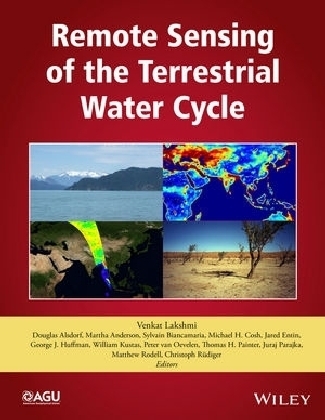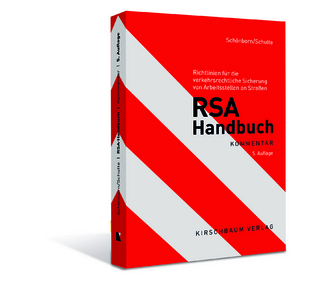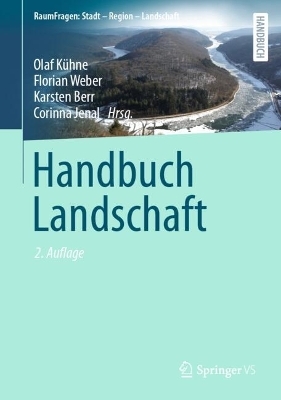
Remote Sensing of the Terrestrial Water Cycle
John Wiley & Sons Inc (Verlag)
978-1-118-87203-1 (ISBN)
Remote Sensing of the Terrestrial Water Cycle is
an outcome of the AGU Chapman Conference held in February
2012. This is a comprehensive volume that examines the use of
available remote sensing satellite data as well as data from
future missions that can be used to expand our knowledge in
quantifying the spatial and temporal variations in the terrestrial
water cycle.
Volume highlights include:
- An in-depth discussion of the global water
cycle
- Approaches to various problems in climate, weather,
hydrology, and agriculture
- Applications of satellite remote sensing in measuring
precipitation, surface water, snow, soil
moisture, groundwater, modeling, and data
assimilation
- A description of the use of satellite data for accurately
estimating and monitoring the components of the hydrological
cycle
- Discussion of the measurement of multiple geophysical variables
and properties over different landscapes on a temporal and a
regional scale
Remote Sensing of the Terrestrial Water Cycle is a valuable
resource for students and research professionals in the
hydrology, ecology, atmospheric sciences, geography, and
geological sciences communities.
Venkat Lakshmi is a Professor at the Department of Earth & Ocean Sciences in the University of South Carolina. He currently chairs the AGU, Chapman conference Program. His research focuses on the eco-hydrological processes and satellite remote sensing. He has published extensively in various geoscience journals including the AGU journals Journal of Geophysical Research and Water Resources Research.
Contributors ix
Preface
Venkat Lakshmi, Douglas Alsdorf, Martha Anderson, Sylvain
Biancamaria, Michael H. Cosh, Jared Entin, George J. Huffman,
William Kustas, Peter van Oevelen, Thomas H. Painter, Juraj
Parajka, Matthew Rodell, and Christoph Rüdiger
Section I: Precipitation 1
1. Rain/No-Rain Classification Using Passive Microwave
Radiometers 3
J. Indu and D. Nagesh Kumar
2. Improvement of TMI Rain Retrieval Over the Indian
Subcontinent 27
Shoichi Shige, Munehisa K. Yamamoto, and Aina Taniguchi
3. Integrating Information from Satellite Observations and
Numerical Models for Improved Global Precipitation Analyses:
Exploring for an Optimal Strategy 43
Pingping Xie and Robert J. Joyce
4. Research Framework to Bridge from the Global Precipitation
Measurement Mission Core
Satellite to the Constellation Sensors Using Ground-Radar-Based
National Mosaic QPE 61
Pierre-Emmanuel Kirstetter, Yang Hong, Jonathan J. Gourley, Qing
Cao, M. Schwaller, and W. Petersen
Section II: Evapotranspiration 81
5. Estimating Regional Evapotranspiration Using a
Three-Temperature Model and MODIS Products 83
Yu Jiu Xiong, Guo Yu Qiu, Shao Hua Zhao, and Fei Tian
6. Water Use and Stream-Aquifer-Phreatophyte Interaction Along a
Tamarisk-Dominated Segment of the Lower Colorado River 95
Saleh Taghvaeian, Christopher M.U. Neale, John Osterberg,
Subramania I. Sritharan, and Doyle R. Watts
Section III: Surface Water 115
7. Controls of Terrestrial Water Storage Changes Over the
Central Congo Basin Determined by Integrating Palsar Scansar,
Envisat Altimetry, and Grace Data 117
Hyongki Lee, Hahn Chul Jung, Ting Yuan, R. Edward Beighley, and
Jianbin Duan
8. Spatial Patterns of River Width in the Yukon River Basin
131
Tamlin M. Pavelsky, George H. Allen, and Zachary F.
Miller
9. Near-Nadir Ka-band Field Observations of Freshwater Bodies
143
Delwyn Moller and Daniel Esteban-Fernandez
Section IV: Snow 157
10. Snow Cover Depletion Curves and Snow Water Equivalent
Reconstruction: Six Decades of Hydrologic Remote Sensing
Applications 159
Noah P. Molotch, Michael T. Durand, Bin Guan, Steven A.
Margulis, and Robert E. Davis
11. Retrieval and Validation of VIIRS Snow Cover Information for
Terrestrial Water Cycle Applications 175
Igor Appel
12. Seeing the Snow Through the Trees: Toward a Validated Canopy
Adjustment for Satellite Snow-Covered Area 199
Lexi P. Coons, Anne W. Nolin, Kelly E. Gleason, Eugene J. Mar,
Karl Rittger, Travis R. Roth, and Thomas H. Painter
13. Passive Microwave Remote Sensing of Snowmelt and
Melt-Refreeze Using Diurnal Amplitude Variations 215
Kathryn Alese Semmens, Joan Ramage, Jeremy D. Apgar, Katrina E.
Bennett, Glen E. Liston, and Elias Deeb
14. Changes in Snowpacks of Canadian Prairies for
1979?2004 Detected from Snow Water
Equivalent Data of SMMR and SSM/I Passive Microwave and Related
Climatic Factors 227
Thian Yew Gan, Roger G. Barry, and Adam K. Gobena
Section V: Soil Moisture 245
15. Some Issues in Validating Satellite-Based Soil Moisture
Retrievals from SMAP with in Situ Observations 247
Thomas J. Jackson, Michael Cosh, and Wade Crow
16. Soil Moisture Retrieval from Microwave (RADARSAT-2) and
Optical Remote Sensing (MODIS) Data Using Artificial Intelligence
Techniques 255
Nasreen Jahan and Thian Yew Gan
17. AMSR-E Soil Moisture Disaggregation Using MODIS and NLDAS
Data 277
Bin Fang and Venkat Lakshmi
18. Assessing Near-Surface Soil Moisture Assimilation Impacts on
Modeled Root-Zone Moisture for an Australian Agricultural Landscape
305
R. C. Pipunic, D. Ryu, and J. P. Walker
19. Assimilation of Satellite Soil Moisture Retrievals into
Hydrologic Model for Improving River Discharge 319
Feyera A. Hirpa, Mekonnen Gebremichael, Thomas M. Hopson, Rafal
Wojick, and Haksu Lee
20. NASA Giovanni: A Tool for Visualizing, Analyzing, and
Intercomparing Soil Moisture Data 331
William Teng, Hualan Rui, Bruce Vollmer, Richard de Jeu, Fan
Fang, Guang-Dih Lei, and Robert Parinussa
Section VI: Groundwater 347
21. Monitoring Aquifer Depletion from Space: Case Studies from
the Saharan and Arabian Aquifers 349
Mohamed Sultan, Mohamed Ahmed, John Wahr, Eugene Yan, and
Mustafa Kemal Emil
22. Dominant Patterns of Water Storage Changes in the Nile Basin
during 2003?2013 367
J. L. Awange, E. Forootan, K. Fleming, and G. Odhiambo
23. Use of Multifrequency Synthetic Aperture Radar (SAR) to
Support Regional-Scale Groundwater Potential Maps 383
Gregory S. Babonis and Matthew W. Becker
24. Monitoring Subsidence Associated with Groundwater Dynamics
in the Central Valley of California Using Interferometric Radar
397
Tom G. Farr and Zhen Liu
Section VII: Data and Modeling
25. NLDAS Views of North American 2011 Extreme Events 409
Hualan Rui, Bill Teng, Bruce Vollmer, David Mocko, and Guang-Dih
Lei
26. Growth Studies of Mytilus californianus Using Satellite
Surface Temperatures and Chlorophyll Data for Coastal Oregon
427
Jessica R. Price and Venkat Lakshmi
27. Impact of Assimilating Spaceborne Microwave Signals for
Improving Hydrological Prediction in Ungauged Basins 439
Yu Zhang, Yang Hong, Jonathan J. Gourley, Xuguang Wang, G.
Robert Brakenridge, Tom De Groeve, and Humberto Vergara
28. Application of High-Resolution Images from Unmanned Aircraft
Systems for Watershed and Rangeland Science 451
A. Rango, E. R. Vivoni, C. A. Anderson, N. A. Pierini, A.
Schreiner-McGraw, S. Saripalli, A. Slaughter, and A. S.
Laliberte
29. Simulation of Water Balance Components in a Watershed
Located in Central Drainage Basin of Iran 463
Ammar Rafiei Emam, Martin Kappas, and Karim C. Abbaspour
30. Estimating Water Use Efficiency in Bioenergy Ecosystems
Using a Process-Based Model 479
Zhangcai Qin and Qianlai Zhuang
31. Watershed Reanalysis of Water and Carbon Cycle Models at a
Critical Zone Observatory 493
Xuan Yu, Christopher Duffy, Jason Kaye, Wade Crow, Gopal Bhatt,
and Yuning Shi
32. Challenges for Observing and Modeling the Global Water Cycle
511
Kevin E. Trenberth
33. Integrated Assessment System Using Process-Based
Eco-Hydrology Model for Adaptation Strategy and Effective Water
Resources Management 521
Tadanobu Nakayama
Index 537
| Erscheint lt. Verlag | 20.1.2015 |
|---|---|
| Reihe/Serie | Geophysical Monograph Series ; 206 |
| Verlagsort | New York |
| Sprache | englisch |
| Maße | 219 x 285 mm |
| Gewicht | 1890 g |
| Themenwelt | Naturwissenschaften ► Geowissenschaften ► Geografie / Kartografie |
| Naturwissenschaften ► Geowissenschaften ► Hydrologie / Ozeanografie | |
| Technik ► Elektrotechnik / Energietechnik | |
| ISBN-10 | 1-118-87203-7 / 1118872037 |
| ISBN-13 | 978-1-118-87203-1 / 9781118872031 |
| Zustand | Neuware |
| Haben Sie eine Frage zum Produkt? |
aus dem Bereich


